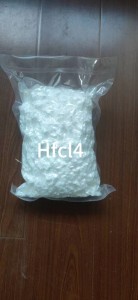Hafnium tetrachloride: the perfect fusion of chemistry and application
In the field of modern chemistry and materials science, hafnium tetrachloride (chemical formula: HfCl₄) is a compound with great research value and application potential. It not only plays an important role in basic scientific research, but also plays an indispensable role in many high-tech industries. This article will explore the chemical properties of hafnium tetrachloride and its wide application, revealing its important position in modern science and technology.

Chemical properties of hafnium tetrachloride
Hafnium tetrachloride is an inorganic compound with a chemical formula of HfCl₄ and a molecular weight of about 273.2. At room temperature, it appears as a white crystal with a high melting point (about 193°C) and boiling point (about 382°C). This compound is easily soluble in water and will quickly hydrolyze to form the corresponding hydrate when it comes into contact with water. Therefore, it needs to be strictly sealed during storage and transportation to avoid contact with moisture.
From the chemical structure point of view, in the hafnium tetrachloride molecule, the hafnium atom is covalently bonded to four chlorine atoms to form a tetrahedral structure. This structure gives hafnium tetrachloride unique chemical properties, making it show good activity in a variety of chemical reactions. For example, it is a Lewis acid that can react with a variety of Lewis bases, which makes it have important application value in organic synthesis.
Preparation method of hafnium tetrachloride
Hafnium tetrachloride is usually prepared by chemical vapor transport or sublimation. Chemical vapor transport is a method that uses a specific chemical reaction to react metallic hafnium with chlorine at high temperature to produce hafnium tetrachloride. The advantage of this method is that it can obtain high-purity products, but the reaction conditions need to be strictly controlled to avoid the generation of impurities. The sublimation method uses the sublimation characteristics of hafnium tetrachloride to convert it directly from solid to gas at a specific temperature and pressure, and then collect it by cooling. This method is relatively simple to operate, but it has high requirements for equipment.


Wide application of hafnium tetrachloride
Semiconductor field
In semiconductor manufacturing, hafnium tetrachloride is an important precursor for the preparation of high dielectric constant materials (such as hafnium dioxide). High dielectric constant materials play a key role in the gate insulation layer of transistors and can significantly improve the performance of transistors, such as reducing leakage current and increasing switching speed. In addition, hafnium tetrachloride is also widely used in chemical vapor deposition (CVD) processes to deposit metal hafnium or hafnium compound films. These films are widely used in the manufacture of semiconductor devices, such as manufacturing high-performance transistors, memory, etc.
Material Science Field
Hafnium tetrachloride also has important applications in the manufacture of ultra-high temperature ceramic materials. Ultra-high temperature ceramic materials have excellent high temperature resistance, wear resistance and corrosion resistance, and are widely used in high-tech fields such as aerospace and national defense. For example, in the aerospace field, ceramics and alloys made of hafnium tetrachloride as raw materials have the advantages of lightweight and high temperature resistance, and can be used to manufacture aircraft parts. In addition, hafnium tetrachloride can also be used to manufacture packaging materials for high-power LEDs. These materials have good insulation and thermal conductivity, which can effectively improve the performance and life of LEDs.
Catalyst Application
Hafnium tetrachloride is an excellent catalyst that can be used in a variety of organic synthesis reactions. For example, in organic synthesis reactions such as olefin polymerization, esterification of alcohols and acids, and acylation reactions, hafnium tetrachloride can significantly improve the efficiency and selectivity of the reaction. In addition, in the field of fine chemicals, hafnium tetrachloride can also be used to prepare compounds such as spices and drugs. Its unique catalytic properties give it broad application prospects in these fields.
Nuclear industry
In the nuclear industry, hafnium tetrachloride can be used in nuclear reactor cooling systems. Its good thermal and chemical stability enable it to operate stably under high temperature and high pressure environments. In addition, hafnium tetrachloride can also be used to manufacture coating materials for nuclear fuels to improve the corrosion resistance and thermal stability of nuclear fuels.



Market prospects and challenges of hafnium tetrachloride
With the rapid development of high-tech industries such as semiconductors, aerospace, and nuclear industry, the market demand for hafnium tetrachloride continues to increase. However, the technical difficulties and environmental protection requirements in its production process have also brought huge challenges to enterprises. At present, the global production capacity of hafnium tetrachloride is mainly concentrated in a few developed countries, and my country's production capacity is relatively low. In order to meet the needs of the domestic market, my country needs to increase investment in the research and development of hafnium tetrachloride production technology to improve production efficiency and product quality.
Hafnium tetrachloride, as an important inorganic compound, has a wide range of applications in chemistry, materials science, semiconductors, nuclear industry and other fields. Its unique chemical properties and excellent physical properties make it play an irreplaceable role in modern science and technology. With the continuous advancement of science and technology, the application scope of hafnium tetrachloride will be further expanded, and its market demand will continue to grow. my country should seize this opportunity, increase investment in the research and development of hafnium tetrachloride production technology, improve independent production capacity, and provide strong support for the development of my country's high-tech industry.
Post time: Apr-15-2025